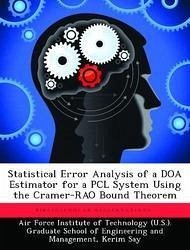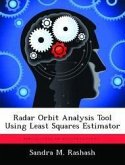Direction of Arrival (DOA) estimation of signals has been a popular research area in Signal Processing. DOA estimation also has a significant role in the object location process of Passive Coherent Location (PCL) systems. PCL systems have been in open literature since 1986 and their applications are not as clearly understood as the DOA estimation problem. However, they are the focus of many current research efforts and show much promise. The purpose of this research is to analyze the DOA estimation errors in a PCL system. The performance of DOA estimators is studied using the Cramer Rao Bound (CRB) Theorem. The CRB provides a lower bound on the variance of unbiased DOA estimators. Since variance is a desirable property for measuring the accuracy of an estimator, the CRB gives a good indication about the performance of an estimator.
Hinweis: Dieser Artikel kann nur an eine deutsche Lieferadresse ausgeliefert werden.
Hinweis: Dieser Artikel kann nur an eine deutsche Lieferadresse ausgeliefert werden.








